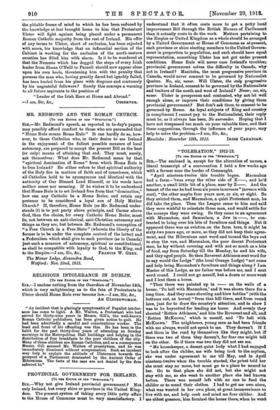MR. REDMOND AND THE ROMAN CHURCH.
[To TRH EDITOR OP TER " SPECTATOR.":1_ SIR,—Mr. Redmond's speech, as reported in to-day's papers, may possibly afford comfort to those who are persuaded that " Home Rule means Rome Rule." It can hardly do so, how- ever, to those Catholics who, in their desire to see Ireland in the enjoyment of the fullest possible measure of local autonomy, are prepared to accept the present Bill as the best (or only) means of attaining that end. They must, surely, ask themselves: What does Mr. Redmond mean by that "spiritual domination of Rome" from which Home Rule is to free Ireland? He either refers to that spiritual authority of the Holy See in matters of faith and of conscience, which all Catholics hold to be synonymous and identical with the authority of Our Blessed Lord Himself, or his words have neither sense nor meaning. If he wishes it to be understood that Home Rule is to set Ireland free from that "domination," how can any Catholic be a Home Ruler, and retain any pretence to be considered a loyal son of Holy Mother Church P If, therefore, Home Rule (as Mr. Redmond under- stands it) is to put party above principle, and Caesar above God, then the choice, for every Catholic Home Ruler, must lie, not between an anti-clerical, anti-Christian autonomy and things as they are, but between Mr. Redmond's conception of "a Free Church in a Free State" (wherein the liberty of the former is to be under the complete control of the latter) and a Federalism which shall give to each province (as in Canada) just such a measure of autonomy, spiritual or constitutional, as shall be compatible with loyalty to God, to the King, and


















































 Previous page
Previous page